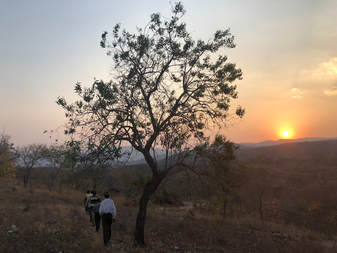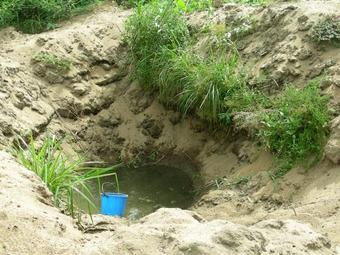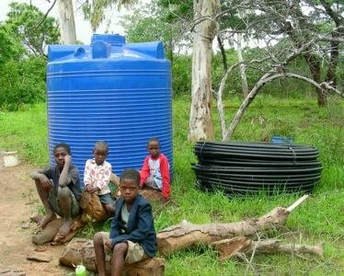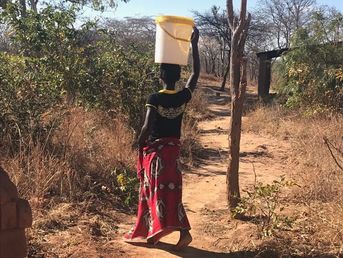
Dr. Nelda Frater - Founder/Chair/GP
In November 2008, I traveled to Malawi with a group of people to see how micro-finance is being used by the local population there to finance small projects to feed themselves. It was extremely interesting to see first hand the use that small sums of money could be put to. It was also fascinating to witness people walking into Opportunity International Bank of Malawi and using their fingerprints instead of security numbers, to access their savings account. As there is a 70% illiteracy rate in the population of Malawi and this group of people tend not to have passports and birth certificates, their fingerprints stored on a 'smartcard', have proven crucial in enabling them to put away their savings. However, in the current food crisis, up to 70% of income is spent on food.
What impressed me most about the Malawians:
I was deeply impressed by the resourcefulness of the people and willingness to try and help themselves. However, as greater than 50% of the population are school children (age 15 years or younger), they need help to enable them to help themselves. HIV and AIDS have taken their toll in taking the lives of the adult population. In fact, the average mortality is only 37 years old. This means that the majority of Malawians are children or elderly people. The bulk of the working age people have already died and of those alive, many are sick, hence the need for outside help.
My impressions as a physician:
Clean drinking water is fundamental to health and the survival of people anywhere. Cholera is a big problem in Malawi and especially for the children. This disease is preventable and is directly caused by drinking dirty water. It claims many children's lives. In some areas I visited, coffins were the most common items on sale.
Message of hope:
Malawi is a country of tremendous natural beauty. Its' people are optimistic and very welcoming to visitors. However, they lack clean drinking water, which is essential for life. The majority of Malawians are of school age and in need of water. Please give a drop. Do give a dam.
In November 2008, I traveled to Malawi with a group of people to see how micro-finance is being used by the local population there to finance small projects to feed themselves. It was extremely interesting to see first hand the use that small sums of money could be put to. It was also fascinating to witness people walking into Opportunity International Bank of Malawi and using their fingerprints instead of security numbers, to access their savings account. As there is a 70% illiteracy rate in the population of Malawi and this group of people tend not to have passports and birth certificates, their fingerprints stored on a 'smartcard', have proven crucial in enabling them to put away their savings. However, in the current food crisis, up to 70% of income is spent on food.
What impressed me most about the Malawians:
I was deeply impressed by the resourcefulness of the people and willingness to try and help themselves. However, as greater than 50% of the population are school children (age 15 years or younger), they need help to enable them to help themselves. HIV and AIDS have taken their toll in taking the lives of the adult population. In fact, the average mortality is only 37 years old. This means that the majority of Malawians are children or elderly people. The bulk of the working age people have already died and of those alive, many are sick, hence the need for outside help.
My impressions as a physician:
Clean drinking water is fundamental to health and the survival of people anywhere. Cholera is a big problem in Malawi and especially for the children. This disease is preventable and is directly caused by drinking dirty water. It claims many children's lives. In some areas I visited, coffins were the most common items on sale.
Message of hope:
Malawi is a country of tremendous natural beauty. Its' people are optimistic and very welcoming to visitors. However, they lack clean drinking water, which is essential for life. The majority of Malawians are of school age and in need of water. Please give a drop. Do give a dam.

Mark Sayers - Honorary Secretary/Consultant Orthodontist
In May 2007, the sixtieth World Health Assembly discussed the need for oral health prevention and promotion for poor and disadvantaged populations. They stated that countries without optimal fluoride levels should consider the administration of fluoride in drinking water, salt or milk in addition, to affordable fluoride toothpaste.
In the UK approximately 6 million people benefit from natural or artificially fluoridated water. Fluoridation of water is known to reduce the number of decayed, missing and filled teeth in both adults and children. Research in both the UK and USA reveal that 1 part of fluoride per million parts of water produces these dental benefits and helps to reduce dental health inequalities in areas of deprivation.
A small amount of fluoride in the water modifies the process of tooth decay by making the enamel more resistant if taken during enamel development. The topical effect of fluoride helps the enamel resist the acid attack from plaque bacteria. Fluoride also reduces the ability of the plaque bacteria from producing acid which breaks down the tooth enamel. The Water Tap Foundation hopes to provide clean water to poor and disadvantaged populations and water fluoridation can provide the following dental benefits: reduce the need for dental extractions, dental abscesses and toothache.
In May 2007, the sixtieth World Health Assembly discussed the need for oral health prevention and promotion for poor and disadvantaged populations. They stated that countries without optimal fluoride levels should consider the administration of fluoride in drinking water, salt or milk in addition, to affordable fluoride toothpaste.
In the UK approximately 6 million people benefit from natural or artificially fluoridated water. Fluoridation of water is known to reduce the number of decayed, missing and filled teeth in both adults and children. Research in both the UK and USA reveal that 1 part of fluoride per million parts of water produces these dental benefits and helps to reduce dental health inequalities in areas of deprivation.
A small amount of fluoride in the water modifies the process of tooth decay by making the enamel more resistant if taken during enamel development. The topical effect of fluoride helps the enamel resist the acid attack from plaque bacteria. Fluoride also reduces the ability of the plaque bacteria from producing acid which breaks down the tooth enamel. The Water Tap Foundation hopes to provide clean water to poor and disadvantaged populations and water fluoridation can provide the following dental benefits: reduce the need for dental extractions, dental abscesses and toothache.

Gursharan Minhas - Treasurer / Consultant Orthodontist
In a world where globalisation and social media have reduced the barriers to trade and communication, the gap between the developed and developing countries remains. In the 21st century there are millions of individuals who do not have access to clean drinking water, a fundamental requirement for survival. I spent 31 days on an expedition in the Gobi Desert, water was scarce and we survived on limited sources and mapping routes based on these sources - with the support of vehicular transport. This experience emphasised to me the importance of access to clean drinking water for local communities in rural locations. With my background in healthcare and an advocate of healthy living, I am able to use my skills in organisation, management, volunteering and fundraising to help communities in developing regions to achieve this vital ingredient for a healthy life.
In a world where globalisation and social media have reduced the barriers to trade and communication, the gap between the developed and developing countries remains. In the 21st century there are millions of individuals who do not have access to clean drinking water, a fundamental requirement for survival. I spent 31 days on an expedition in the Gobi Desert, water was scarce and we survived on limited sources and mapping routes based on these sources - with the support of vehicular transport. This experience emphasised to me the importance of access to clean drinking water for local communities in rural locations. With my background in healthcare and an advocate of healthy living, I am able to use my skills in organisation, management, volunteering and fundraising to help communities in developing regions to achieve this vital ingredient for a healthy life.

Cynthia Joseph-Lewis - Registered Nurse, Care Lecturer and Mentor
My involvement in the Water Tap Foundation (TWTF) stems from my passion to help others in making this world a better place. The education of disadvantaged children and orphans is at the core of my passion. I believe that each child has within them a talent, and my objective is to help to support children to achieve their full potential in life. Particularly in contributing to the education of young girls in communities where traditionally they are disadvantaged and are not given the opportunity of education. Since 2004, I have donated my time to many charity projects which resulted in trips to Rwanda, Tanzania, Ghana and recently in Malawi. Through these projects I obtained first-hand knowledge about local issues such as poverty, hunger, malnutrition and diseases. I also discussed options and models of care approaches. I have experienced the unique hospitality of Ghanaians, the resilience of Rwandese and the warmth of Malawians.
Besides helping others, charity work contributes considerably to one’s career development. It helped in defining my career path, while enhancing existing skills and developed a variety of new skills. In today's world of rapid change,
there are always new and necessary skills to learn and build. Last - but not least! - personal satisfaction, a strengthened sense of personal achievement and value, and increased confidence often result from making a positive impact on an organization or directly on a person's life. Through charity work I have learnt new languages and experienced new cultures and ways of life. I have found pleasure and satisfaction in giving back to the world by traveling to other countries to volunteer my time, skills and efforts to help improve the living standards of the people there.
My involvement in the Water Tap Foundation (TWTF) stems from my passion to help others in making this world a better place. The education of disadvantaged children and orphans is at the core of my passion. I believe that each child has within them a talent, and my objective is to help to support children to achieve their full potential in life. Particularly in contributing to the education of young girls in communities where traditionally they are disadvantaged and are not given the opportunity of education. Since 2004, I have donated my time to many charity projects which resulted in trips to Rwanda, Tanzania, Ghana and recently in Malawi. Through these projects I obtained first-hand knowledge about local issues such as poverty, hunger, malnutrition and diseases. I also discussed options and models of care approaches. I have experienced the unique hospitality of Ghanaians, the resilience of Rwandese and the warmth of Malawians.
Besides helping others, charity work contributes considerably to one’s career development. It helped in defining my career path, while enhancing existing skills and developed a variety of new skills. In today's world of rapid change,
there are always new and necessary skills to learn and build. Last - but not least! - personal satisfaction, a strengthened sense of personal achievement and value, and increased confidence often result from making a positive impact on an organization or directly on a person's life. Through charity work I have learnt new languages and experienced new cultures and ways of life. I have found pleasure and satisfaction in giving back to the world by traveling to other countries to volunteer my time, skills and efforts to help improve the living standards of the people there.
Proudly powered by Weebly